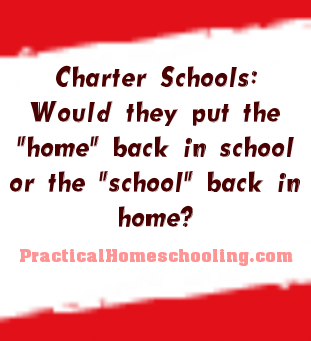Homeschooling and Charter Schools
By Sam Blumenfeld
Printed in Practical Homeschooling #28, 1999.
 Charter Schools: Would they put the "home" back in school or the "school" back in home?
Charter Schools: Would they put the "home" back in school or the "school" back in home?

|
 |
 The idea behind the Charter School movement is to allow independent individuals and groups to create innovative, alternative public schools which would be exempt from the usual regulations governing tax-financed schools. The idea sounds good, but the committees that grant the charters usually have a bias against plans that call for traditional education. This was well demonstrated recently in Massachusetts when a group of parents who wanted to establish a charter school based on classical and traditional academic principles were denied their charter.
The idea behind the Charter School movement is to allow independent individuals and groups to create innovative, alternative public schools which would be exempt from the usual regulations governing tax-financed schools. The idea sounds good, but the committees that grant the charters usually have a bias against plans that call for traditional education. This was well demonstrated recently in Massachusetts when a group of parents who wanted to establish a charter school based on classical and traditional academic principles were denied their charter.
I asked these parents why didn't they start a private school of their own, since most of them were fairly affluent. Their reply was that creating such a school would require, at the minimum, a million dollars, and they weren't prepared to make such an investment. One wonders about the priorities of some affluent Americans who think nothing of investing a half million to a million dollars in a home, but are unwilling to pay for private education.
This state of mind was well illustrated by the present conflict in a wealthy gated community in southern California called Coto de Caza, where the residents wanted the school district to build a public school within their enclave because the public schools outside the enclave were too crowded. The problem is that students whose families live outside the gated community would have to be admitted. Somehow, the idea of building a large private school within the gates just didn't appeal to the rich families who live in Coto de Caza, where the average home costs over $600,000.
Which brings us to homeschoolers, some of whom have thought of starting a charter school exclusively for homeschoolers. The motive? Money.
The beauty and moral strength of the homeschool movement to date has been the willingness of parents to make the necessary financial sacrifices required when one parent must give up a job in order to stay home and homeschool.
This sense of sacrifice did not stop an attorney in Lansing, Michigan, from applying for a charter school specifically to serve homeschoolers. Believe it or not, the charter was actually approved but was immediately followed by a major lawsuit filed by the American Civil Liberties Union of Michigan on the grounds that the charter violated the separation of church and state.
The charter school's founder insisted that the academy would not be a religious school. He described the school as a high-tech, distance learning center that would connect homeschoolers around the state via multimedia computers, satellite video transmissions, and toll-free telephone numbers. Under Michigan's charter law, the school would have received $5,500 for each of its 750 enrolled students, a total of over $4.1 million. However, the court ruled in favor of the ACLU.
As expected, a good number of Michigan homeschoolers opposed the charter school, recognizing its obvious dangers. Eugene Newman, president of Christian Home Educators of Michigan and father of ten homeschooled children, issued a position paper entitled Why Charter Schools Should Be Opposed. In essence, he argued that:
- Home-based charter schools would affirm in a new way the illegitimate role the state plays in education. "Dependency, any dependency on state programs, in any area," he wrote, "will always be at the expense of the private moral duty of citizens."
- Even well-intentioned people can be corrupted by statism.
- Public education isn't necessary and it is destructive of our society. The state has no compelling interest in education. From the biblical perspective the family has a compelling interest, and perhaps in other spheres, such as church or business, but not the state.
- When we are forced to pay for private schooling, we have a vested interest in giving the proper attention to education. It would be folly to think that parents who are "given free" a school program will value it as if it were their own property.
- For every student enrolled in a charter school, the state finds a legitimate reason to increase taxes.
- Home education cannot survive if the private sphere is eroded by homeschoolers' support of charter schools.
- Public funding invites state regulation and control. Homeschoolers would lose the present academic freedom they now enjoy.
- If chartered homeschooling becomes the norm, those homeschoolers who resist state regulation will be considered a fringe group who must be forced into submission.
- A home-based charter school will bring the government into the home. Thus. the wall that should separate the home from the state would be breached.
Perhaps the best argument against the charter school concept is that it will add to an already heavy tax burden that we must all bear. One of the great arguments that homeschoolers have had in gaining public support is the fact that homeschooling decreases the tax burden on the taxpayer. That cogent argument will be lost if homeschoolers begin accepting public funds. Also, the issue of educational freedom is bedrock for the homeschool movement. By accepting some form of public funding, homeschoolers will be saying that money is more important than freedom.
The founding fathers sacrificed their economic well-being in their fight for freedom. The idea that freedom can be maintained without sacrifice defies all of human history. Freedom won at great cost in blood and treasure can be lost by a future generation tempted by false material gain. As F. A. Hayek wrote in his classic The Road to Serfdom:
A strong tradition of political liberty is no safeguard if the danger is precisely that new institutions and policies will gradually undermine and destroy that spirit. The consequences can of course be averted if that spirit reasserts itself in time and the people not only throw out the party which has been leading them further and further in a dangerous direction but also recognize the nature of the danger and resolutely change their course.
Homeschoolers have an obligation to do all in their power to change the course of our culture which is headed toward greater control over our lives by an ever-expanding government. The charter school movement is one of those new institutions that will gradually undermine the spirit of educational freedom which is a cornerstone of a free society. Thus, homeschoolers must not be tempted by the charter school and must remain wary of any attempt by the public schools to bribe them into becoming part of the government system.